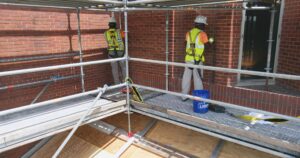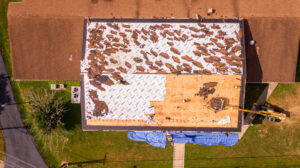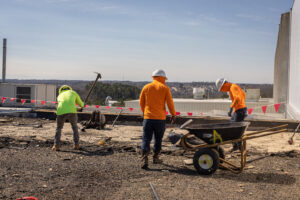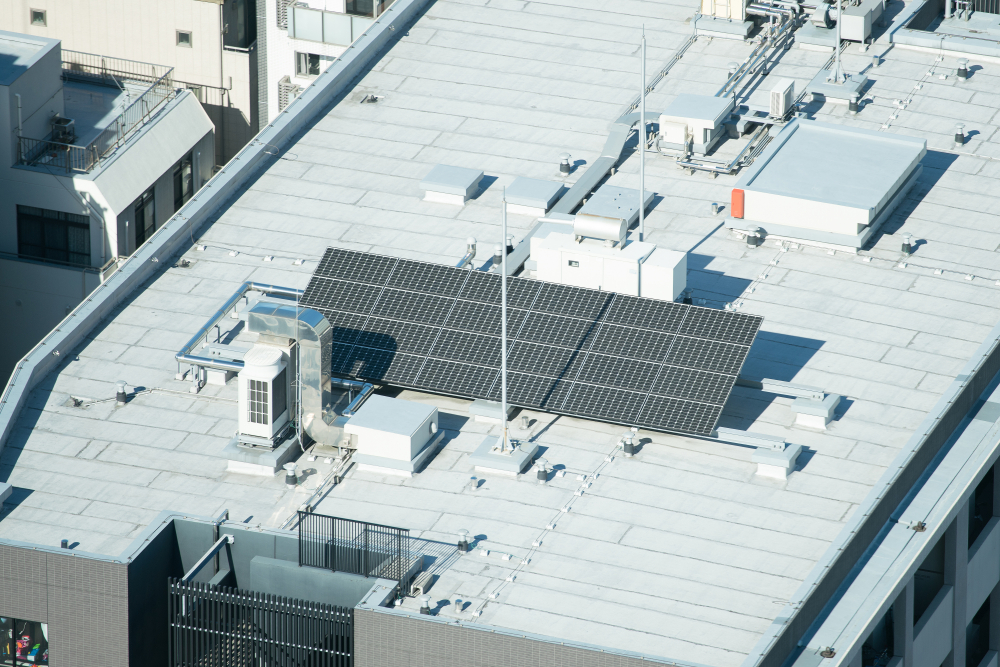
Before you even think about roof sealants, it’s important to understand why your roof needs protection. The main reason is that even the toughest materials cannot withstand the constant barrage of weather conditions. Rain, hail storms, and snow all take their toll on roofs. Some of these problems can be prevented in a number of ways. However, once they have already occurred, you will have to turn to a more permanent solution.
Treating your roof with roof sealants can help keep water out and reduce potential damage and leaks. Using a quality roof sealant can help your roof stay strong and protected for years to come.
Roof Sealant For Leaks
Roof sealant is a liquid that’s applied to the roof of your commercial building. Its purpose is to fill in cracks and holes, which helps keep water from getting through the roof and into the building. This can help prevent a huge number of problems, from minor leaks to serious issues such as mold and mildew growth.
If you’re not sure whether or not your roof needs a sealant, then here are a few signs that it might:
-The roof has leaking problems
-There are areas on the roof where water seems to collect
-You notice moss or algae growth on the roofing
How Often Should You Apply Roof Sealant?
Roof sealants should be applied every year. Some believe that they only need to apply them once, and then they won’t have any other issues because their roof is “sealed.” This isn’t true, though, as sealants are only a temporary solution. The key is to reapply them on a yearly basis in order to ensure that the roof stays protected.
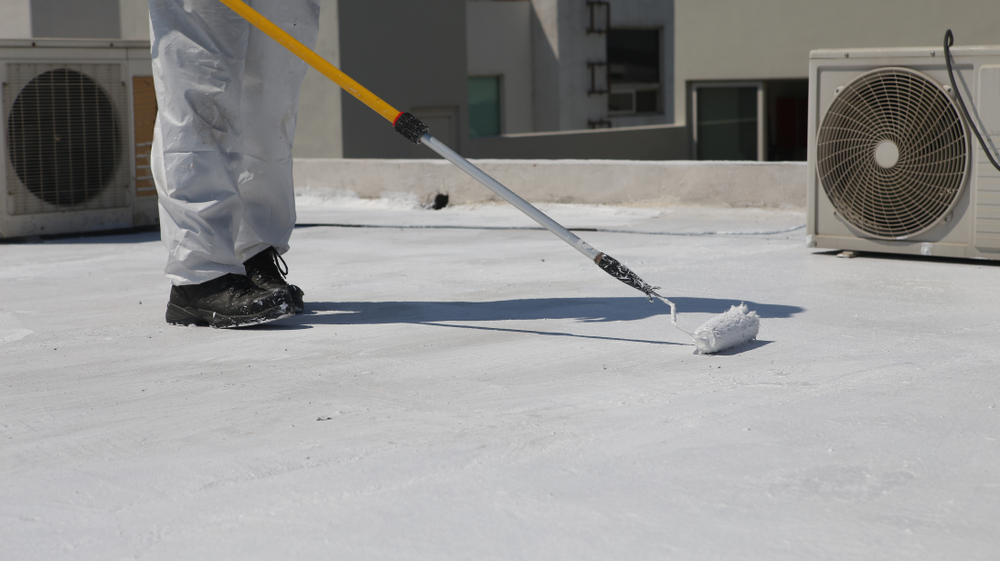
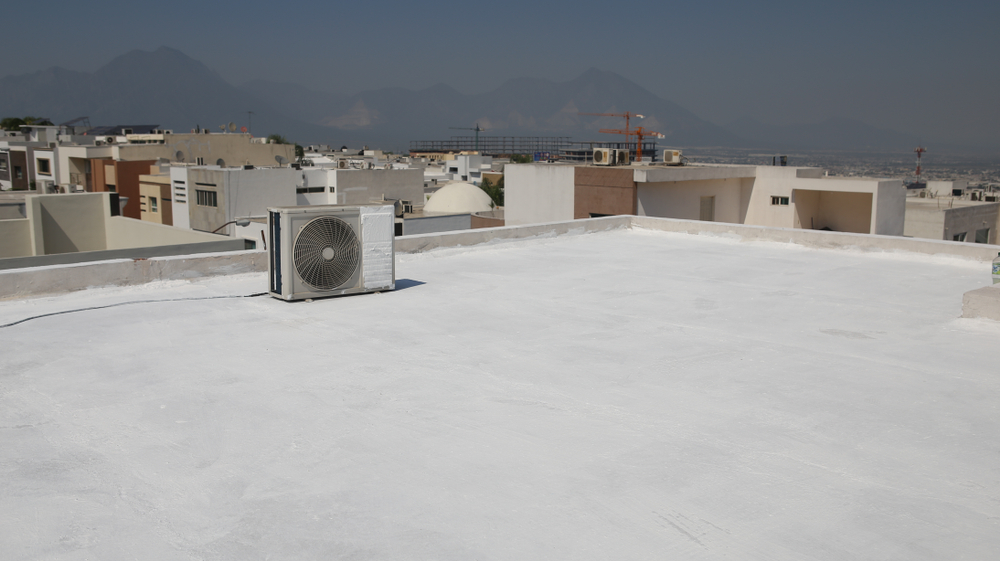
Sealants are a Good Way of Protecting your Roof Against Water Damage.
Sealing your roof, are you? Roof sealants are designed to coat the exterior of your roof and protect it from water damage.
Roofs are exposed to the elements every day, which can lead to leaks. The asphalt shingles on most roofs eventually wear out, especially when a lot of trees around the house cause leaves and needles to collect. A leaky roof isn’t just an eyesore; it can make your home vulnerable to mold and mildew growth, as well as rot and insect infestation.
Roof sealants help fix these problems by coating the exterior of your roof and protecting it from water damage. It acts as a barrier between your roof and the weather outside. It’s best to apply this product during spring or fall because those seasons have less extreme temperatures that can harm the material.
The most important factors in choosing a roof sealant are the type of roof you have and what level of protection you need. The cost and ease of application also play a role in determining which roof sealant is right for your building.
Roof sealants are available in two forms: solvent-based and water-based.
Solvent-based sealants are resistant to the elements, but they are more costly, thicker, and difficult to use than water-based ones. They emit harmful fumes, so it’s important to use masks or respirators when applying them.
Water-based sealants are less resistant to weathering, but they are easier to apply, less expensive, and don’t emit harmful fumes.
Five Varieties of Roof Sealants:
Acrylic Roof Sealants deflect UV rays and protect roofs from hot climates. They are moisture-resistant but not waterproof, and they do not hold up well to water ponding.
Silicone Sealants are known for their high level of moisture resistance, UV resistance, and durability, making them a good option for areas that are prone to high levels of rainfall, snow, or sun exposure. These are the most expensive types of sealant on the market, making them a less popular choice for large roofing projects.
Polyurethane Sealants are waterproof and more flexible than silicone sealants, making them a good choice for roofs that are subject to movement, such as in areas with high levels of seismic activity. They are also less resistant to UV radiation and may not last as long as silicone sealants in hot climates.
Liquid-Based Rubber Sealants are an easy and efficient way to protect commercial roofs from the sun and rain. Their thin, rubberized coating bonds to the surface of the roof, forming a watertight seal that keeps out moisture and extends the life of your roof.
When small leaks appear on a roof, Sealant Tape can be the perfect repair for the problem. Sealant tapes are made up of tiny strips of moisture-resistant material, which has an adhesive backing that’s applied directly to the roofing material. This makes it simple to apply without the need for a labor-intensive procedure. Tape sealants are also less expensive, making them more suitable for minor roof repair jobs. They aren’t, however, intended to cover vast areas of roofing.
Disposing of Roof Sealants
When it’s time to dispose of roof sealant, be sure to follow the manufacturer’s instructions. Some sealants can be disposed of in the trash, while others must be disposed of through a hazardous waste program.
Benefits of Using Roof Sealant
Roof sealants don’t serve just one purpose—there are a handful of benefits you can get, depending, of course, on the type of sealing you go for. Here’s a rundown of those.
- Prevents water infiltration and subsequent roof damage like rotting, rusting, and leaking
- It keeps the building cooler by reflecting the sun’s heat, leading to decreased energy bills
- Maintains the structural integrity of the roof
- Prevents the formation of mold & mildew on roof surfaces
- Eliminates the need for expensive and time-consuming roof repairs
- Can add years of life to an existing roof
- It saves you from the potential health hazards of mold and mildew growth in your living environment
- Fire-resistant properties can help prevent the spread of fire in the event of a blaze.
So, as you can see, roof sealants offer a range of benefits to both building owners and occupants. If you’re looking for an easy, affordable way to protect your roof—and the people and property underneath it—then sealants are definitely worth considering.
If you’re looking for a quality roof sealant, then be sure to contact us here at Eskola Roofing. We can help you find the perfect sealant for your needs and ensure a long-lasting, damage-free roof.
Thanks for reading!



